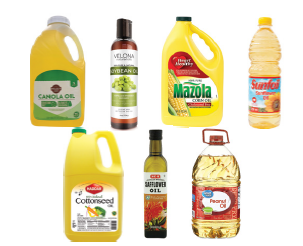| Reader, Did you know that a skin cancer diagnosis has nothing to do with how much sunlight you've been exposed to…
And everything to do with the foods you eat?  Researchers have discovered a direct link between seed oils – the so-called "vegetable" oils – and skin cancer | If you are a regular reader, that won't surprise you. Our modern demonization of the sun is all about the commercial interests of dermatologists and sunscreen manufacturers – and not protection against cancer.
Don't be fooled by aggressive marketing campaigns that scare you into believing every time the sun strikes your skin, you're risking malignant melanoma.
Let me show you what I mean…
A large study in the UK followed 170,000 participants for almost three decades. The researchers found a direct link between skin cancer and certain types of fat.1
The researchers revealed the highest risk for skin cancers – including malignant melanoma as well as squamous cell carcinoma and basal cell carcinoma – was linked to a high intake of polyunsaturated fats.
These are the dangerous fats found in so-called "vegetable" oils.
These seed oils are used in almost every American home, and also in the manufacture of most pre-packaged and processed foods – including baked and fried foods, coffee creamers, margarine, crackers, microwave popcorn, potato chips, packaged snacks, and more.
These cancer-causing seed oils include: - Canola oil
- Soybean oil
- Corn oil
- Sunflower oil
- Cottonseed oil
- Safflower oil
- Peanut oil
Here's the thing…
Malignant melanoma has never been caused by the sun, despite what you've heard. These claims are based on flimsy evidence, all of which disappears under scrutiny – and I'm sure the sunscreen manufacturers know it.
If the sun really were the cause of skin cancer, wouldn't you expect people who live in sunnier climates to have the highest melanoma rates?
It may surprise you to learn that populations with the most sun exposure have the lowest rates of skin cancer in the world.
What's worse is that mainstream medicine's recommendation to wear SPF 50 actually raises your risk of skin cancer – as well as breast and colon cancers.
It also increases your risk of developing a host of other disorders, including diabetes… osteoporosis… arthritis… heart disease… polycystic ovary syndrome… depression… hypertension… and multiple sclerosis.
Yes, it's true that getting a sunburn is dangerous for your skin. But you still need moderate exposure to sunlight – and you certainly should not avoid it altogether.
When you block the sun's UVB rays, your body can't make enough vitamin D, which causes deficiencies that make you vulnerable to multiple health problems. Eat These Fats To Beat Skin Cancer My advice is to forget the sunscreen and get those cheap and dangerous vegetable oils out of your diet.
Instead, here are the main fats and oils you should be consuming: - Omega-3s: Today, most people eat too few omega-3s and too many pro-inflammatory omega-6s. Omega-3s are the fatty acids found in grass-fed meats and cold-water fish. Meanwhile, vegetable oils are loaded with omega-6s.
Your best sources of omega-3s are grass-fed beef, wild-caught salmon, avocado, walnuts, olives, and olive oil.
I also recommend supplementing with the two most potent omega-3s – eicosapentaenoic acid and docosahexaenoic acid, better known as EPA and DHA. You need at least 600 mg of DHA and about 60 mg of EPA — every day.
- Lard: Our grandparents and great-grandparents consumed loads of lard, and they experienced extremely low rates of skin cancer.
Lard is an animal fat that is high in heart-healthy saturated fat. In recent generations, lard has almost completely disappeared from home kitchens. But until the early 1960s, lard was a staple cooking fat around the world.
If you buy lard, make sure it comes from natural sources. But beware – the lard sold in most grocery stores is typically hydrogenated for a longer shelf life. It's not the real stuff. One easy rule of thumb: If it's not refrigerated, forget it.
- Coconut Oil: For years, coconut fat was demonized as the enemy of health because of its saturated fat content. But multiple studies reveal that coconut oil improves your levels of heart-healthy HDL, brain function, and energy metabolism.
It also has powerful anticancer properties.2
The key to coconut oil's health benefits is its medium-chain triglycerides or MCTs. The two MCTs in coconut oil — capric and lauric acid – reduce the oxidative stress that causes skin cancer tumors.3
I cook with coconut oil because it has a very stable chemical structure. That means it doesn't break down at high heat. Eggs and shrimp are delicious cooked in coconut oil. Healthy natural fats are also found in dark chocolate, eggs, butter, nuts, and cheese. To Your Good Health, 
Al Sears, MD, CNS
References: - Park MK, et al. "Fat intake and risk of skin cancer in U.S. adults" Cancer Epidemiol Biomarkers Prev. July 2018.
- Verma P, et al. "In Vitro Anticancer Activity of Virgin Coconut Oil and its Fractions in Liver and Oral Cancer Cells." Anticancer Agents Med Chem. 2019;19(18):2223-2230.
- Sandhya S, et al. "Impact of coconut kernel extract on carcinogen-induced skin cancer model: Oxidative stress, C-MYC proto-oncogene and tumor formation." Heliyon. 2024 Apr 16;10(8):e29385.
|
No comments:
Post a Comment